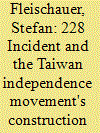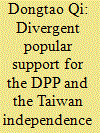| Srl | Item |
| 1 |
ID:
079926


|
|
|
|
|
| Publication |
2007.
|
| Summary/Abstract |
After the Second World War, Taiwan was returned to Chinese authority after 50 years of Japanese colonial rule. Only 18 months later, the local inhabitants of the island revolted against the new Chinese rulers of the KMT regime, demanding a greater degree of autonomy. After a brief period of feigned negotiations, this uprising was brutally suppressed by military reinforcements from the mainland. This 228 Incident of 1947 came to play a pivotal role in the struggle of the Taiwan independence movement. One of the major tasks of the movement was to create and propagate a distinct Taiwanese identity, which would legitimate the strife for an independent Taiwanese nation. In the course of the last 60 years, however, these attempts to create a Taiwanese "We" group distinct from China have not been static, but have had to be redefined and renegotiated according to a changing international and domestic environment. These alterations of group demarcation have necessitated reinterpretations of the 228 Incident, as a means of maintaining its legitimizing power for the Taiwan independence movement. As could be observed in the spectacular 228 hand-in-hand rally in 2004, redefinition and renegotiation are still unfolding to this day.
|
|
|
|
|
|
|
|
|
|
|
|
|
|
|
|
| 2 |
ID:
114799


|
|
|
|
|
| Publication |
2012.
|
| Summary/Abstract |
Mainstream views in China tend to believe that lower popular support for the DPP shown in the 2008 presidential election indicates parallel declining support for the Taiwan Independence Movement (TIM). However, this study shows that during the DPP administration of 2000-2008, popular support for the DPP and the TIM has become divergent: at the aggregate level, popular support for the DPP has generally declined since 2000, but that for the TIM has actually increased and then remained stable; at the individual level, Taiwanese people's dissatisfaction with the DPP administration significantly reduced their support for the DPP in 2008, but had no independent effect on their nationalist sentiment. Further analysis of the TIM's support base shows that the supposedly pro-status-quo pan-blue camp actually provided an increasing number of Taiwanese nationalists, which stabilized popular Taiwanese nationalism and weakened the DPP's monopoly of it.
|
|
|
|
|
|
|
|
|
|
|
|
|
|
|
|